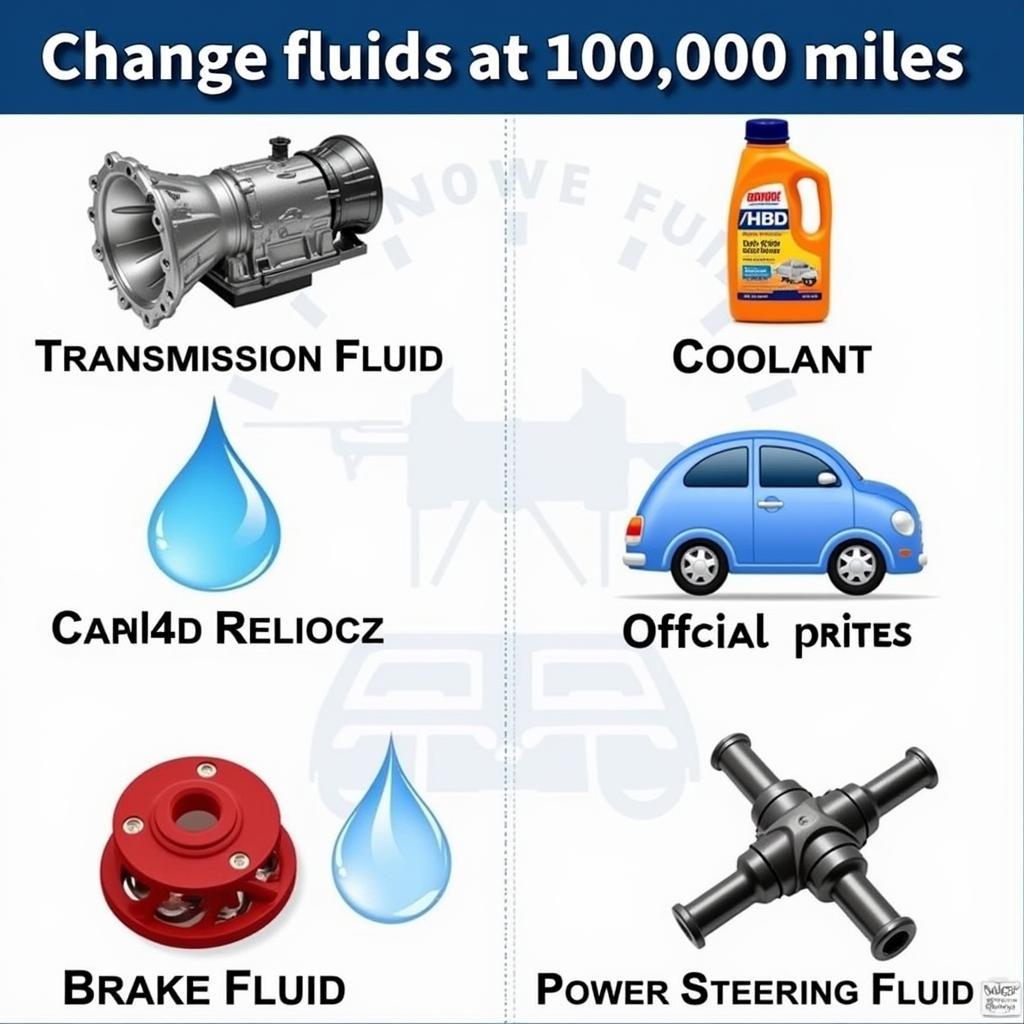Hitting the 100,000-mile mark on your car is a significant milestone. It also signals that some essential maintenance required on a car at 100,000 miles is due. Ignoring these tasks can lead to costly repairs down the road, so understanding what needs attention is crucial for keeping your vehicle running smoothly and safely.
Don’t let the 100,000-mile mark intimidate you. By being proactive and addressing the necessary maintenance, you can extend the life of your vehicle and enjoy many more miles on the road. See our toyota rav4 car maintenance schedule for more details on maintaining a popular car model.
What Maintenance is Due at 100,000 Miles?
Reaching 100,000 miles is a significant achievement for any car. While regular maintenance should have kept it in good shape, certain components require specific attention at this milestone. Maintenance required on a car at 100,000 miles often includes key areas like your timing belt, spark plugs, and fluids.
Timing Belt Replacement
One of the most critical maintenance tasks at this mileage is the timing belt replacement. The timing belt synchronizes the engine’s camshaft and crankshaft, ensuring proper valve operation. A broken timing belt can cause catastrophic engine damage, so replacing it preventatively is highly recommended.
Spark Plug Replacement
Spark plugs ignite the air-fuel mixture in the engine cylinders. Worn-out spark plugs can reduce fuel efficiency, cause misfires, and even damage the catalytic converter. Replacing them at 100,000 miles ensures optimal engine performance and fuel economy.
Fluid Changes
Various fluids in your car require attention at this mileage. This includes the transmission fluid, coolant, brake fluid, and power steering fluid. Changing these fluids helps maintain the proper functioning of these systems and prevent premature wear.
 Essential Fluid Changes at 100,000 Miles
Essential Fluid Changes at 100,000 Miles
What Should I Check at 100,000 Miles?
Besides the scheduled maintenance, it’s also essential to check certain components at 100,000 miles. This includes the suspension, brakes, and tires.
Suspension Inspection
The suspension system ensures a smooth and comfortable ride. Have a mechanic inspect the shocks, struts, and other suspension components for wear and tear.
Brake Inspection
Brakes are crucial for safety. Inspect the brake pads, rotors, and calipers for wear and damage. If you’re unsure about [how much does brake maintenance cost on cars](https://autotippro.com/how much-does-brake-maintenance-cost-on-cars/), consult a professional mechanic for a comprehensive evaluation.
Tire Inspection
Tires are the only point of contact between your car and the road. Check the tire tread depth and pressure. Replace worn-out tires to ensure optimal grip and handling.
Why is 100,000 Miles a Big Deal?
100,000 miles signifies that your car has seen its fair share of road time. Many components start to wear out around this mileage, making preventive maintenance crucial.
-
Increased Wear and Tear: Parts naturally wear out over time, and 100,000 miles marks a point where many components reach the end of their lifespan.
-
Preventing Costly Repairs: Addressing maintenance needs at 100,000 miles can prevent more expensive repairs down the line.
-
Maintaining Safety and Reliability: Regular maintenance ensures the safety and reliability of your vehicle.
“Regular maintenance is like an insurance policy for your car,” says John Smith, a certified automotive technician with 20 years of experience. “It’s an investment that pays off in the long run.”
Thinking about a car that requires less maintenance? Check out our article on low maintenance cars under 5000.
What Happens if I Don’t Do the 100,000-Mile Maintenance?
Ignoring the recommended maintenance required on a car at 100,000 miles can have serious consequences.
-
Decreased Fuel Efficiency: Worn-out spark plugs and dirty fluids can reduce fuel efficiency.
-
Reduced Engine Performance: A worn timing belt or dirty fluids can negatively impact engine performance.
-
Increased Risk of Breakdowns: Neglecting maintenance increases the risk of unexpected breakdowns.
“Ignoring maintenance is like playing Russian roulette with your car,” warns Jane Doe, another experienced automotive technician. “You might get lucky for a while, but eventually, something will go wrong.”
Planning for the future of your car’s maintenance? Take a look at our guide for maintenance of your car after 150 000 miles. For a specific car model maintenance schedule, you can check our guide on annual maintenance on a lincoln town car.
Conclusion
The maintenance required on a car at 100,000 miles is essential for its longevity and performance. By addressing these needs, you can ensure that your car continues to run smoothly and reliably for many more miles. Contact AutoTipPro at +1 (641) 206-8880 or visit our office at 500 N St Mary’s St, San Antonio, TX 78205, United States for expert advice and assistance with your car maintenance needs.




Leave a Reply